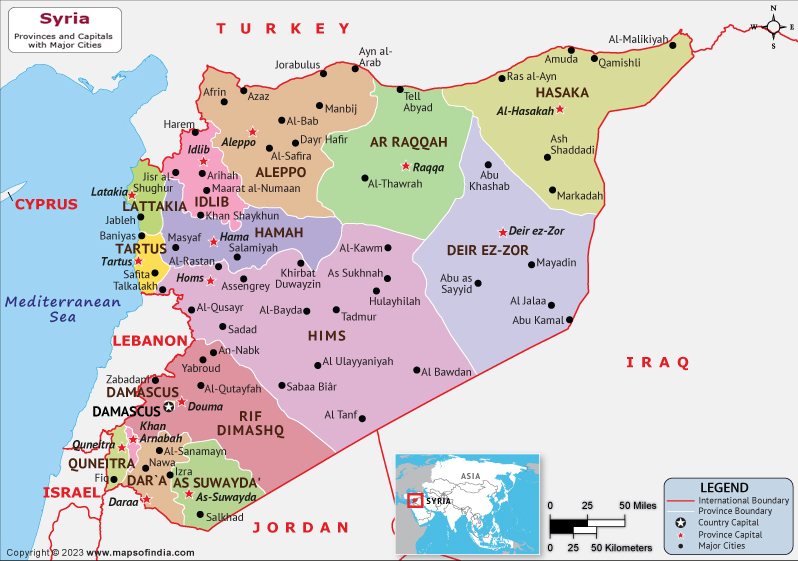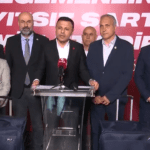After years of political fragmentation, civil war, displacement, and military stalemate, the question of Syria’s future governance is no longer abstract — it is urgent. In a landmark moment this April, a coalition of Syrian Kurdish political forces issued a joint declaration calling for a “democratic and decentralized Syria.” The document proposes a new constitutional order that upholds the territorial integrity of the state while empowering its diverse communities to govern themselves within it.
The Kurdish vision centers on:
- – Equal citizenship for all Syrians, regardless of ethnicity or sect;
- – Local control over education, cultural affairs, and security — including the right to teach in Kurdish and administer regional policing;
- – And institutional guarantees for power-sharing between Kurds, Arabs, Assyrians, and other components of the Syrian mosaic.
Importantly, this initiative was not framed in secessionist or ethno-nationalist terms. Rather, it emphasized inclusive governance, legal pluralism, and decentralization as a national project — not a Kurdish one.
Parallel to this, the Druze community in Suwayda has steadily, though more cautiously, voiced support for increased local self-governance. Their demands — for autonomy in civil affairs, security, and resource management — have grown in intensity amid frustration with both the Assad regime’s neglect and the sectarian risks of opposition coalitions. While not issuing formal political charters like the Kurds, the Druze position is increasingly aligned with the call for a devolved, locally responsive state.
The response from Ankara, long ‘opposed’ to any form of Kurdish self-rule across its southern border, was publicly dismissive but unusually measured. President Erdoğan rejected the Kurdish plan as “nothing more than a dream,” but his language notably lacked the usual rhetorical firepower. He made no reference to the Syrian Democratic Forces (SDF), nor did he invoke the label of terrorism — a striking departure from previous Turkish responses.
This softened tone is telling. It reflects a strategic recalibration: while Ankara remains opposed to any form of ethno-political federalism, it increasingly appears open to decentralized governance in Syria — provided it is framed institutionally rather than ethnically, and does not empower actors seen as security threats.
Amid shifting dynamics, the convergence between Kurdish and Druze decentralization demands is emerging as the most realistic framework for political reintegration in Syria. It offers a model of governance that:
- – Respects Syria’s territorial integrity,
- – Prevents renewed authoritarianism,
- – And acknowledges the lived realities of communities that have governed themselves in wartime, often more effectively than the central state.
It is not federalism, nor fragmentation — but functional localism within a unified constitutional framework. And that might be the only viable path forward.
Erdoğan’s Quiet Autonomy Experiment
In 2012, Turkish President Recep Tayyip Erdoğan orchestrated the passage of Law No. 6360, a sweeping and deeply consequential piece of legislation that restructured Turkey’s entire model of local governance. On the surface, the reform was framed in technocratic terms — a rationalization of administrative boundaries to improve service delivery, streamline bureaucracy, and bring public resources closer to the citizen. Ministries echoed familiar themes: modernization, efficiency, fiscal optimization.
But behind this administrative facade lay a far more deliberate and strategic political calculus.
At the time, Erdoğan was pursuing a bold — though ultimately short-lived — peace process with the Kurdistan Workers’ Party (PKK) and its imprisoned leader, Abdullah Öcalan. One of the longstanding Kurdish demands was for greater regional autonomy and recognition of cultural and linguistic rights within a framework that respected Turkey’s territorial integrity. Yet any open discussion of federalism or ethnically-defined self-rule risked igniting a fierce backlash from the military, nationalist opposition, and even Erdoğan’s own conservative base.
Law No. 6360 offered a workaround: by transforming the status of provinces with populations over 750,000 into “metropolitan municipalities” (büyükşehir belediyeleri) and reclassifying rural villages and small towns as urban neighborhoods (mahalleler) under centralized city governance, the law gave elected local officials — many of them Kurds — de facto control over large and previously marginalized regions. Kurdish-majority provinces such as Diyarbakır, Mardin, Van, and Şanlıurfa suddenly gained broad administrative authority over infrastructure, public services, and local development — all without a single constitutional amendment or formal acknowledgment of Kurdish autonomy.
This was decentralization in everything but name: a way to satisfy Kurdish aspirations through the language of administrative efficiency, rather than political restructuring. It was a quiet experiment in soft autonomy, cloaked in the language of municipal reform.
While the initiative eventually collapsed, undone by the breakdown of peace talks in 2015 and Erdoğan’s subsequent authoritarian turn with the appointment of trustees, the institutional logic of Law No. 6360 remains deeply relevant. It offers a template for reconciling local self-governance with national unity, one that doesn’t rely on ethnic federalism or constitutional overhaul.
Nowhere could this model be more timely than in post-conflict Syria, where the state’s collapse has created a patchwork of Kurdish-controlled zones, Alawi Arab towns, and minority communities, such as the Druze in Suwayda — that have grown increasingly estranged from centralized rule. The challenge in Syria today is how to rebuild a unified state without reimposing a discredited model of Ba’athist centralism — and without provoking the centrifugal forces that formal federalism might unleash.
Law 6360: A Technocratic Path to Kurdish Inclusion
At first glance, Law No. 6360 appeared to be a sweeping administrative reform aimed at modernizing Turkey’s local governance. Its technical provisions were significant in scope:
- – It expanded the number of metropolitan municipalities from 16 to 30, covering all provinces with populations above 750,000.
- – It abolished the legal status of all villages (köyler) and small-town (belde) municipalities, folding them into the nearest district municipalities as urban neighborhoods (mahalleler) — regardless of their geographic or cultural identity.
- – It curtailed the powers of district municipalities (ilçeler) by transferring control over key domains — such as regional planning, water and sewage infrastructure, public transportation, and budgetary allocations — to newly empowered metropolitan municipalities.
- – It dissolved special provincial administrations (il özel idareleri), removing a layer of state-appointed bureaucracy and reassigning their assets, personnel, and authority to elected municipal officials.
On paper, these measures were justified by the language of efficiency, cohesion, and fiscal streamlining. In practice, however, they radically reshaped the balance of power between Ankara and the periphery — and between the Turkish state and its Kurdish citizens.
Nowhere was this transformation more politically loaded than in Kurdish-majority provinces such as Diyarbakır, Van, Mardin, Şanlıurfa, and Hakkâri. In these areas, pro-Kurdish parties like the Peace and Democracy Party (BDP) — the precursor to the HDP — already held strong municipal mandates. With the enactment of Law 6360, these Kurdish-led municipalities gained jurisdiction over not only cities but also the surrounding rural districts, villages, and towns — which until then had either operated as independent beldes or fallen under direct state supervision.
This greatly expanded the Kurdish political space. For the first time, Kurdish mayors had centralized control over entire provinces — managing budgets, overseeing infrastructure projects, implementing cultural programming, and engaging in symbolic acts of representation such as bilingual signage and Kurdish-language events.
And yet, all of this was done without rewriting the constitution, declaring autonomy, or redrawing administrative boundaries based on ethnicity. It was a stealth experiment in political decentralization, packaged as a neutral reform of municipal law.
This was Erdoğan’s quiet offer to the Kurds: “You can have local power — if you don’t call it autonomy.”
In retrospect, Law 6360 may have represented the high-water mark of Kurdish political inclusion in Turkey’s modern republic — achieved not through revolution, but through technocratic restructuring.
But the bargain was short-lived. When the peace process between the Turkish state and the PKK collapsed in 2015, Erdoğan shifted sharply toward authoritarian nationalism. Accusing Kurdish municipal leaders of complicity with terrorism, he moved swiftly to remove elected Kurdish mayors and replace them with government-appointed trustees (kayyumlar) — a practice that continues to this day.
The once-empowered metropolitan municipalities of Diyarbakır, Mardin, and Van became instruments of recentralization, their budgets redirected, their cultural programs canceled, and their elected leaders jailed or exiled.
Thus, Law 6360’s potential to serve as a bridge between Kurdish political demands and Turkish territorial unity was squandered. Yet its underlying structure — a unitary state devolving meaningful administrative power through metropolitan governance — still offers a viable framework for deeply divided, post-conflict societies like Syria.
Conclusion and Policy Recommendations:
Syria’s future cannot be dictated by the legacy of authoritarian centralism, nor restored by coercive unity. The country today demands a governance model that reflects the lessons of war, displacement, and local resilience. What Syria needs is not federalism by ethnicity nor a return to Ba’athist rigidity, but a national framework for meaningful municipal autonomy — one that empowers its diverse communities within a single, reconstituted republic.
Turkey’s Law No. 6360 offers a crucial precedent. While its original purpose was to extend administrative efficiency, it granted Kurdish-majority municipalities de facto autonomy — a gesture that, for a brief moment, aligned local governance with democratic participation. This structure itself remains a viable foundation for countries seeking to manage internal diversity through administrative decentralization rather than ethnic fragmentation.
For Syria, this means drafting a comprehensive municipal reform law that standardizes local governance based on population, administrative capacity, and regional integration. Villages should be reclassified as neighborhoods under regional municipalities. Small municipalities under a viable threshold should be merged into larger districts. Mid-sized towns would retain their councils but delegate broader functions to new metropolitan municipalities — particularly in major regional centers. These entities would serve as planning and service-delivery anchors for their surrounding areas, enabling coherent local development and more equitable public administration.
What makes this model both feasible and urgent is that it does not rely on ethnic federalism or redrawing borders. It offers the Kurds, the Druze, and other historically sidelined groups real authority over their local affairs — not as a special concession, but as part of a country-wide system that applies to all regions equally. This equal application is essential to prevent resentment and to ensure that decentralization becomes a national norm, not a fragmented exception.
The reform may need constitutional enshrinement to succeed in the Syrian context. It should guarantee periodic local elections, budgetary independence, and clear legal protections for mayors and councils against political dismissal. In a post-Assad Syria, legitimacy must now come from bottom-up civic participation, not from foreign guarantors or presidential decrees.
Furthermore, this reform should be tied to reconstruction and refugee return. Municipalities that adopt transparent, elected governance structures should be prioritized for reconstruction aid. Syrians who fled should know they are returning not just to buildings and rubble, but to local institutions they can influence and trust.
In the end, a decentralized, municipally governed Syria offers the best hope for national healing. It is a model rooted in administrative logic, democratic principles, and political realism. It offers inclusion without dismemberment, governance without tyranny, and local dignity without national division. What Syria needs is not a new border — but a new bond between people and power. This reform can be the beginning of that bond.
Against this background, a Syrian version of Law 6360, grounded in inclusive, uniform municipal reform, could provide the necessary balance. If implemented equitably and constitutionally, such a model could help consolidate governance, empower historically marginalized communities, and reconcile Syria’s ethnic and sectarian fault lines within a unified territorial framework.
By: News About Turkey (NAT)



